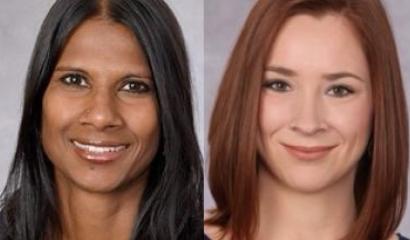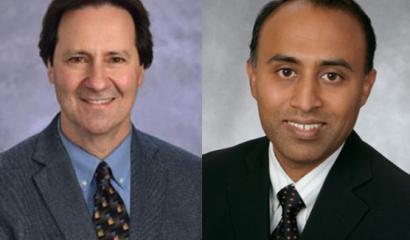Researcher Spotlights
We are changing the landscape of healthcare every day.
Each month, Phoenix Children’s Research spotlights leading physicians and other clinical leaders for their work in the areas of Research, Education and/or Advocacy. This month, we are spotlighting Thomas J. Sitzman, MD for his work in the field of Research and Alexandra M. Walsh, MD for her contributions to the field of Advocacy.
Thomas J. Sitzman, MD
Thomas J. Sitzman, MD, is a plastic surgeon and health services researcher at Phoenix Children’s Hospital. Dr. Sitzman received his medical degree from Duke University School of Medicine in Durham, North Carolina. He then completed a plastic surgery training at the University of Wisconsin in Madison, and a fellowship in pediatric plastic surgery at The Hospital for Sick Children in Toronto, Ontario.
Dr. Sitzman’s clinical practice focuses on the care of children with cleft lip and cleft palate (CL/CP). His research has identified five-fold variation in re-operation rates for children with CL/CP depending on the treating surgeon and hospital. He led a clinical trial of surgeon-delivered audit and feedback to reduce surgeon-dependent variation and to improve surgical outcomes.
He is currently the principal investigator for a 14-site NIH-funded study of comparative effectiveness of surgical approaches for children with persistent speech problems after their initial cleft palate repair. Additionally, Dr. Sitzman is co-investigator for an 18-site NIH-funded comparative effectiveness study of surgical approaches for primary cleft palate repair. In addition to his work comparing surgical approaches to cleft surgery, he leads projects investigating the role of structured care delivery processes in improving surgical outcomes.
“Dr. Sitzman is not only an exemplary researcher, but he is also a superb clinician and surgeon. He is a tireless advocate of clinical outcomes research and quality improvement initiatives throughout Phoenix Children's Hospital. Dr. Sitzman’s research has highlighted the collaborative focus that Phoenix Children’s values in achieving optimal clinical outcomes, and he is a tremendous asset to plastic and reconstructive surgery at the national and international levels.”
– Davinder J. Singh, MD, Division Chief, Plastic Surgery
Outside the office, Dr. Sitzman is an avid ultra-marathoner. When he is not in the operating room or the office, he is likely out on the trails.
More About Dr. Sitzman’s Research
Cleft palate is one of the most common pediatric congenital anomalies, occurring in one of every 800 children. While the cleft palate is repaired in infancy, up to 40 percent of children will subsequently develop severe speech limitations due to problems with palate function. This condition is known as velopharyngeal insufficiency (VPI). Numerous surgical procedures exist for treating VPI, with procedure selection being highly related to the surgeon and treatment center preferences. In 2020, our team at Phoenix Children’s received a grant from the National Institutes of Health to compare the effectiveness of existing surgical procedures for VPI. Launched in March 2021, the study, known as the VPI-Outcomes Prediction Study (VPI-OPS), will enroll more than 600 children with VPI from 13 cleft centers in the U.S. and Canada during the next three years. Using comparative effectiveness approaches, we will be able to rigorously establish which procedures are most effective at improving speech and better define the risks of each procedure. As part of the study, we are also evaluating a novel application of dynamic MRI to evaluate palate function during speech. This MRI approach, first implemented at Phoenix Children’s in 2018, may reduce the need for more invasive imaging modalities such as nasoendoscopy and videofluoroscopy in the management of these patients. The study’s results will ultimately enable surgeons to select the most effective, least harmful surgical procedure for each child with VPI.
Recent Publications
- Five-Fold Variation Among Surgeons and Hospitals in the Use of Secondary Palate Surgery
- Feasibility of Surgeon-Delivered Audit and Feedback Incorporating Peer Surgical Coaching to Reduce Fistula Incidence following Cleft Palate Repair: A Pilot Trial
- Facilitators and Barriers to Implementing Standardized Outcome Measurement for Children with Cleft Lip and Palate
Alexandra M. Walsh, MD, MSPH
Alexandra M. Walsh, MD, MSPH, is Director of the Survivorship Program and Fertility Preservation in the Center for Cancer and Blood Disorders at Phoenix Children’s. Dr. Walsh started the hospital’s fertility preservation program and is a seasoned professional who specializes in leukemia and lymphoma, fertility preservation, pediatric oncology survivorship and supportive care.
Dr. Walsh enjoys identifying issues that face pediatric patients and utilizing a multidisciplinary, collaborative approach to solve them. She is involved in the standardization of the department’s treatment of chemotherapy-induced nausea and vomiting, and making sure all eligible patients can participate in fertility preservation regardless of their ability to pay. She also leads the Consistent Care conference for the division and is a member of the Adult Care and Transition of Care committees, as well as the Institutional Review Board and the Pharmacy and Therapeutics committees.
Outside of her roles at Phoenix Children’s, Dr. Walsh serves on the board of Children’s Cancer Network and as the Director of the Arizona Department of Public Health’s Childhood Cancer Control Committee and works through the Children’s Oncology Group at a national level on the Supportive Care, Long-Term Follow-Up and Chemotherapy-Induced Nausea/Vomiting committees.
Dr. Walsh earned her undergraduate degree from Cornell University and a medical degree from The Ohio State University College of Medicine. She completed a pediatric residency at University of Chicago and a pediatric hematology/oncology fellowship at University of Alabama.
In addition to her clinical work, Dr. Walsh is dedicated to research and mentoring future generations of physicians specializing in hematology/oncology. She is involved in research projects with nurse practitioner students, medical students, residents, fellows and junior attendings, and enjoys helping them craft a research idea, perform the data analysis and present a poster and write a paper.
In recognition of her service to the field of medicine, Dr. Walsh was named the 2021 Advocate of the Year at Phoenix Children’s, as nominated by her peers for the Heart and Hands Clinical Excellence Awards.
Dr. Walsh has three amazing children, ages 15, 9 and 8, and enjoys barre classes, cooking and baking.
“The support I have received from my friends and colleagues at Phoenix Children’s is amazing, and I am very grateful to be able to have a job that I enjoy and am able to make a difference in the care of my patients,” Dr. Walsh says.
More About Dr. Walsh’s Research
While significant medical advances in cancer detection and treatment have improved long-term survival rates for pediatric patients, intensive treatments may lead to infertility in adulthood. This prospect for cancer survivors can be quite distressing.
Such challenges have fueled preservation research. Current preservation techniques for post-pubertal patients include semen and oocyte cryopreservation, and efforts have been underway to find alternatives for young cancer patients.
Recent developments in technology have made ovarian tissue cryopreservation (OTC), or freezing, a safe and effective option for female patients of all ages, and many babies have been born utilizing this ovarian tissue.
Dr. Walsh is at the forefront of efforts to provide this service to current patients free of charge, with ovarian cryopreservation fully funded by the Phoenix Children’s Hospital Foundation. The hope is that it will eventually become a standard-of-care procedure.
Dr. Walsh, along with Kathy Hinkle, RN, conduct upfront, in-depth discussions with patients and their parents and guardians regarding cancer treatment and its effects on infertility, ovarian tissue removal, cryopreservation and reimplantation of the ovarian tissue in the future for pregnancy.
“The patient’s ovarian issue is well-traveled after removal,” Dr. Walsh jokes. “It makes a stop for a short time at Magee-Womens Hospital in Pittsburgh (University of Pittsburgh Medical Center) for processing before it is transferred to ReproTech in St. Paul, Minnesota, for long-term storage. From there, the patient holds the right to their tissue.”
“Having this [OTC] option for our patients is significant,” Kathy Hinkle said. “It can be a game-changer for our patients in so many ways.”
The next step for Dr. Walsh and her team is pursuing similar fertility preservation methods for prepubertal boys through testicular tissue cryopreservation (TTC). Studies exploring ways to utilize frozen testicular tissue to restore fertility and the ability to produce sperm later in life are well underway, and Dr. Walsh hopes Phoenix Children’s can be part of this cutting-edge research. Testicular tissue collected from patients electing to undergo TTC would be used to study long-term preservation of testicular function through cryopreservation, but patients would also retain the rights to preserved tissue for future use.
The field of fertility preservation is rapidly growing in pediatric oncology, with a steady increase in the number of patients and families choosing fertility-sparing interventions before treatment begins. As medical teams pursue cryopreservation protocols at their institutions, Phoenix Children’s intends to be at the forefront of this research to provide these life-changing options to our patients.
Recent Publications
- Cryopreservation of Ovarian Tissue for Pediatric Fertility
- Creation of a chemotherapy-induced nausea/vomiting dashboard to improve outcomes for pediatric cancer patients
- Facilitators and barriers to clinical practice guideline-consistent supportive care at pediatric oncology institutions: A Children's Oncology Group study
- High prevalence of gene fusions and copy number alterations in pediatric radiation therapy-induced papillary and follicular thyroid carcinomas

